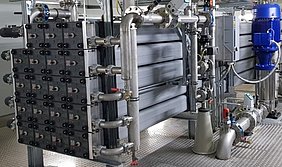How should concentrates from NF/UO processes be handled in future? Is treatment of the concentrates reasonable? How can a discharge into a water body be evaluated? Ten project partners focused on these and other questions within the research project KonTriSol.
NF/RO processes are increasingly used for drinking water treatment in Germany. Main applications are water softening or the removal of further inorganic and organic water ingredients, including anthropogenic micropollutants.
Residues from the NF/RO treatment process, so-called concentrates, usually have a high salt content and contain the concentrated organic trace substances, including additives that are applied during the treatment process. Thus, the local authorities increasingly consider the discharge of these concentrates into water bodies as critical.
In order to remove the existing technical and administrative barriers for the implementation of the NF/UO technology in the field of drinking water treatment, the goal of the KonTriSol project was to provide practical solutions and integrated evaluation concepts. At TZW, the following project results were obtained:
- Development of an analytical method for the quantitative trace-level determination of polyacrylates
- Development of a lab-based test for the determination of the retention of antiscalants and other water constituents during nanofiltration and reverse osmosis
- Determination of the retention of antiscalants (phosphonates and polyacrylates) during filtration through NF/RO membranes
- Determination of the efficiency of activated carbon for the treatment of concentrates
- Elaboration of a guidance document for the assessment of concentrate discharges as decision support tool for water utilities and authorities during approval procedures.
The final report with all results of the project can be downloaded from the KonTriSol homepage.

![[Translate to English:] Prüfstelle-Produktprüfung_Teststand Test centre and product testing](/fileadmin/_processed_/0/9/csm_TZW-Karlsruhe_Pruefung_Geraete-Teststand_377188946c.jpg)

























